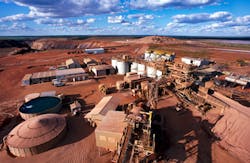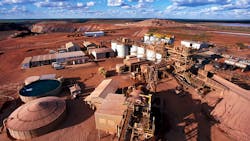Production of rare earth minerals in the United Stated can be expanded to create thousands of new jobs and to boost the domestic economy, according to a new study from the National Center for Policy Analysis (NCPA).
Rare earths play an important role in everyday life and are used in the production of a wide range of products from computers and smart phones to wind turbines and defense equipment. Despite the significant number of applications they are used for, U.S. domestic production is very limited and as many as 96 percent of the rare earth minerals in the United States are imported, mostly from China.
The reason for this large proportion of imports is not in the lack of these elements because they are found in relatively high amounts. The problems are rooted in administration and low investment in the U.S. mining sector, the NCPA research found. When a company wants to start mining operations, it has to wait for an average of seven years to obtain all required permits and approvals — much longer that most other countries, which naturally puts investors off.
RELATED: Japan signs deal with India on rare earths production
These delays are caused by both state and federal requirements. For example, one of the biggest rare earth producers globally, the Mountain Pass mine in California, was forced to remain out of business between 2002 and 2012, despite having completed the required Environmental Impact Statement in 2004.
Augusta Resource Corp's Rosemont copper mine had to deal with delays from the Army Corps of Engineers, the U.S. Fish and Wildlife Service, the state Historic Preservation Office, American Indian tribes and the Center for Biological Diversity one after the other, before it was allowed to start mining operations. Another example of regulation preventing mining works is the case of Rare Element Co., which owns the Bear Lodge Project in Wyoming. An exploration permit to expand test drill programs has already been granted but the company cannot start work unless it obtains federal permits, which are still at least three years away.
If those hurdles are taken into consideration and reforms are implemented, the United States may become among the most desired countries for rare earths exploration and production, NCPA said. Another prerequisite for the successful development of the industry is the review of federal and state safety regulations, as the advancement of new technology and environmental improvements have made processes safer and less harmful to the environment.
The report estimated that if rare earths production was facilitated, states could benefit by $40 billion in increased gross state product, while state revenues would be boosted by $724 million, without having to change tax regimes. In addition, this could also lead to the creation of about 3,660 well-paid jobs, the study found.
According to NCPA adjunct fellow Tom Tanton, the United States could learn from the best practices implemented in countries like Australia and Canada and realize that it is economically unreasonable to import such a large proportion of rare earth minerals when it has such bountiful but unexploited reserves. All of the various agencies that contribute to the huge delays in permitting should be combined into a single unit authority, which can allow operations to start much quicker, he added.

